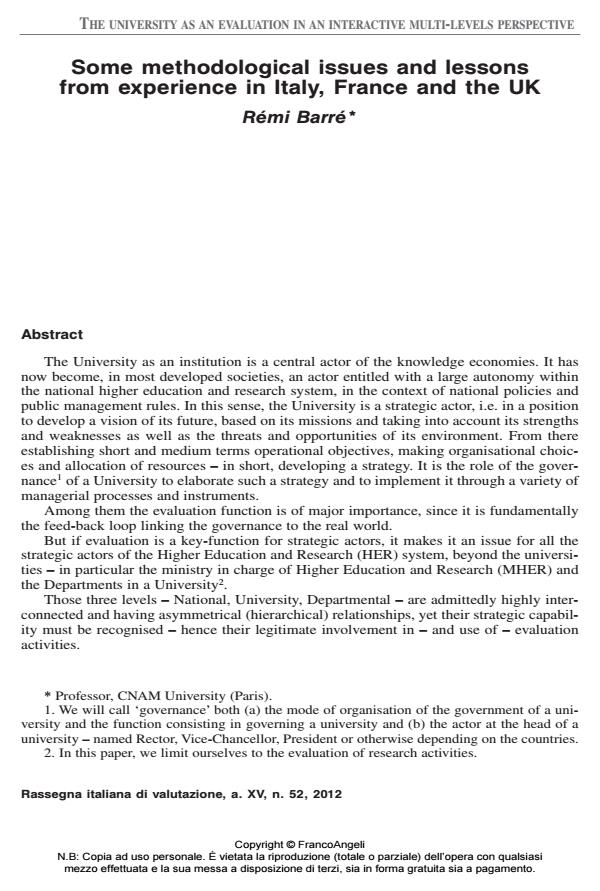Some methodological issues and lessons from experience in Italy, France and the UK
Journal title RIV Rassegna Italiana di Valutazione
Author/s Remì Barrè
Publishing Year 2013 Issue 2012/52
Language Italian Pages 17 P. 9-25 File size 504 KB
DOI 10.3280/RIV2012-052002
DOI is like a bar code for intellectual property: to have more infomation
click here
Below, you can see the article first page
If you want to buy this article in PDF format, you can do it, following the instructions to buy download credits

FrancoAngeli is member of Publishers International Linking Association, Inc (PILA), a not-for-profit association which run the CrossRef service enabling links to and from online scholarly content.
The University as an institution is a central actor of the knowledge economies. It has now become, in most developed societies, an actor entitled with a large autonomy within the national higher education and research system, in the context of national policies and public management rules. In this sense, the University is a strategic actor, i.e. in a position to develop a vision of its future, based on its missions and taking into account its strengths and weaknesses as well as the threats and opportunities of its environment. From there establishing short and medium terms operational objectives, making organisational choices and allocation of resources - in short, developing a strategy. It is the role of the governance1 of a University to elaborate such a strategy and to implement it through a variety of managerial processes and instruments. Among them the evaluation function is of major importance, since it is fundamentally the feed-back loop linking the governance to the real world. But if evaluation is a key-function for strategic actors, it makes it an issue for all the strategic actors of the Higher Education and Research (HER) system, beyond the universities - in particular the ministry in charge of Higher Education and Research (MHER) and the Departments in a University2. Those three levels - National, University, Departmental - are admittedly highly interconnected and having asymmetrical (hierarchical) relationships, yet their strategic capability must be recognised - hence their legitimate involvement in - and use of - evaluation activities. The objective of this paper is - focussing on the University as an evaluation actor - to identify and discuss the question of its relationships, in terms of evaluation activities, with University Departments on one side and with the MHER on the other - which are both evaluation actors as well. Our standpoint is to refer to evaluation methodologies and our examples will mostly be based on the evaluation activities of the UNIMIL, as well as those taking place in France, at various levels. We also make some references to the evaluation implications of the Bologna process. In a first paragraph, we give an overview of the relationships among the evaluation actors of the different levels; in a second and third paragraph, we focus on the relationships of a university with the departmental and national level, respectively, discussing some methodological issues, concluding then on the stakes which a university faces as an evaluation actor.
Keywords: Research evaluation, University evaluation, multilevel evaluation
Remì Barrè, Some methodological issues and lessons from experience in Italy, France and the UK in "RIV Rassegna Italiana di Valutazione" 52/2012, pp 9-25, DOI: 10.3280/RIV2012-052002